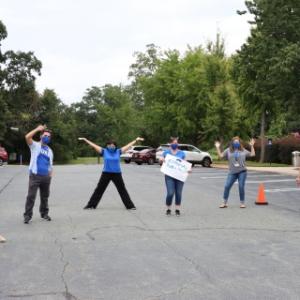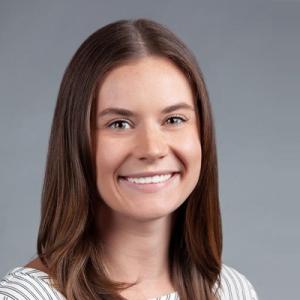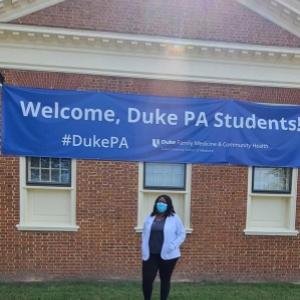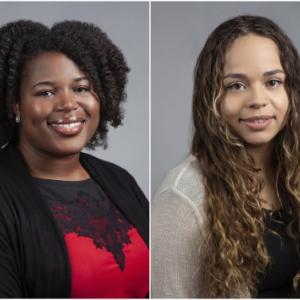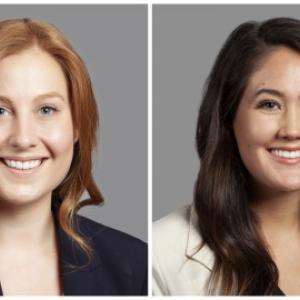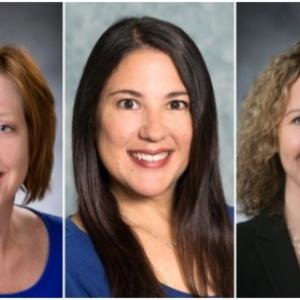Physician Assistant Division Name Changes to Division of PA Studies; PA Initiatives, Programs Will Expand
Effective today, September 1, 2020, the name of the PA Division in the Department of Family Medicine & Community Health has changed to Division of PA Studies.
Division Chief Patricia McKelvey Dieter, MPA, PA-C, says this change more accurately reflects the expansion of programs and the variety of work done within the division.
“It also reflects the growth of the PA concept nationally, internationally, and within Duke Health, and it more accurately describes the role of the division in studying PA education, practice, and research,” Dieter says.
Duke Physician Assistant Program Hosts Virtual Graduation Ceremony and Drive-Through Certificate Presentation
The Duke Physician Assistant (PA) Program held its graduation and certificate ceremony on Aug. 21, with a live-streamed ceremony.
Initially scheduled to take place in Duke Chapel, program leadership knew they could not re-create the feeling of a celebration in such an iconic location. Instead, they tried to find unique ways to honor each of the 89 students.
Duke Physician Assistant Program Holds Virtual White Coat Ceremony for Class of 2022
Each August, the incoming class of the Duke Physician Assistant Program finishes their orientation week with a ceremony to celebrate the significance of health care's ubiquitous white coat.
Usually, the white coat ceremony is a private event that takes place in the classroom, with faculty advisers symbolically helping students into their white coats for the first time. This year, it took place via Zoom and was live-streamed to friends and family.
Second Year PA Student Blog: Alissa Kirby
Duke Physician Assistant Program Adapts to Changes Overnight, Continues to Innovate During COVID-19
As the COVID-19 global pandemic moves into August, what everyone hoped would be a time-limited issue is becoming the country’s new standard. Masks have become a fashion statement as well as a political flashpoint. All are tired of Zoom meetings, and desperate extroverts are socializing across yards.
At the Duke Physician Assistant Program, leaders are leaning into challenges while looking for opportunities to re-imagine the structure of students’ education, not just for the immediate crisis, but for the future.
Duke PA Students Laura Okolie and Leslie Flego named Student Representatives by the American Academy of Physician Assistants
The American Academy of Physician Assistants (AAPA) recently elected Duke Physician Assistant students Laura Okolie and Leslie Flego as 2020-2021 student representatives of their House of Delegates (HOD).
First Year PA Student Blog: Shelby Moored
Duke Physician Assistant Program Awarded $2M HRSA Grant
The Health Resources and Services Administration (HRSA) awarded the Duke Physician Assistant Program a $2 million five-year grant for the project “Physician Assistant Leaders in Underserved Communities.”
The grant will provide $400,000 for scholarships to be awarded to 10 disadvantaged students each year, including students who are members of racial and ethnic minority groups. It will also allow the creation of unique clinical opportunities through longitudinal placement in primary care settings in medically underserved communities.
Physician Assistant Students Hannah Lee and Meghan Horio Receive Chancellor's Service Fellowship
1st-year Physician Assistant students Hannah Lee and Meghan Horio are the recipients of the Chancellor's Service Fellowship, the first all-PA team to win the award.
Hannah Lee describes the award and tells us about the project they have planned.
Quincy Jones, Mara Sanchez, and Susan Hibbard Receive PAEA STAR Program Recognition
Quincy Jones, MSW, MHS, PA-C; Mara Sanchez, MMS, PA-C, RD; Susan Hibbard, PhD; and Joanne Rolls, MPAS, MEHP, PA-C, assistant professor at the University of Utah, have been recognized by PAEA's Support to Advance Research (STAR) Program for their proposal, LGBTQ Curricula in Physician Assistant Programs. Their study focuses on the amount and delivery of curricular content related to caring for lesbian, gay, bisexual, transgender, and queer (LGBTQ) populations.
